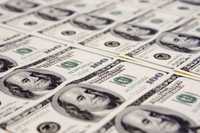| Home | About | Archives | RSS Feed |

The Independent Investor: Cashless Society, Think Again
 |
While the government shuts down and the markets swoon over the debt ceiling drama and the future of the U.S. financial system, the U.S. Federal Reserve Bank issued a new version of the $100 bill this week. Demand for the new bill is quite brisk, thank you.
To some, this may come as a surprise. After all, we all know that the world is moving inexorably toward cashless transactions. The most recent report by McKinsey & Co. found that for households with income of more than $60,000 a year, cash accounted for only 2 percent of total payments, while credit cards (both credit and debit) represented 60 percent of all retail transactions. Only 7 percent of all transactions in the U.S. are done with cash and most of those are with small amounts of money.
Between credit cards, PayPal, mobile payments and other technologically digitalized methods the death of paper currency has been predicted for years. The problem is that this particular patient never dies and is, in fact, stronger than ever. This summer the amount of U.S. currency in circulation hit an all-time high of $1.19 trillion, according to the Fed. That equates to roughly $3,800 in cash per person, if one assumes all of it is held in America, but it is not.
Admittedly, international demand for American currency started to decline about the time the Euro was introduced back in 2002. It was a period of political stability, economic growth and financial stabilization but all that changed in 2008. The global financial crisis triggered renewed demand for our banknotes and still continues today. In times of crisis, the American currency still offers foreigners the safest haven for their savings. And many Americans evidently feel the same way.
Our $100 bill, featuring the likeness of Benjamin Franklin, is the most widely sought after note of all. We have been printing more of these "Benjamin's" than any other denominations over the past 20 years The most recent Fed statistics show that as of Dec. 31, 2012, there were 10.3 billion $1 bills in circulation, 8.6 billion $100 bills, and 7.4 billion $20 bills, followed by $5, $10s, $50s and $2s. A little more than 75 percent of the worth of all U.S. currency worldwide is in $100 bills.
The use of smaller denominations has plateaued, reflecting the use of alternative methods of payment for day-to-day transactions. In contrast, the demand for $100 bills is growing. It appears that in times of fear both domestic and foreign holders are eager to keep a stack of $100 bills under the mattress or in safety deposit boxes as opposed to in bank or brokerage accounts. And let's not forget the black markets, criminal syndicates, drug cartels and tax evaders, all of whom use cash extensively and for them, the bigger the bill the better.
The new $100 bill is long overdue. It was supposed to reach your local bank two years ago but there was a problem with the new security measures imbedded within the bill. The new note has several features that will make it easier to authenticate, yet more difficult for counterfeiters to copy. (The paper is made right here in the Berkshires, too.)
Although less than 0.01 percent of all U.S. currency in circulation is counterfeit, it still totals as much as $95 million and most of it is in $100 bills. Most countries use special Swiss presses (sold only to governments) to print their money. So it is difficult for common ordinary crooks to forge our currency. However, rogue countries, such as North Korea, can acquire these presses and have been known to print U.S. bills, especially the $100 bill, which law enforcement called "Super-notes."
Some countries , most notably Belgium, France, Canada, the U.K., Sweden, Australia and the Netherlands, have neared the point of effective cashlessness. That makes the banks happy since they spend billions per year processing, storing and guarding that paper. Governments also like it. The annual cost, for example, of minting U.S. currency is $219,240,000.
But I suspect that cash will continue to be useful for any number of people in a great many places. And that’s not necessarily a bad thing. Psychological studies indicate that when we use physical notes and coins, we spend more sensibly. While cash may not be "king" anymore, I think the feel of a little cash in the pocket makes one's day a little bit brighter, don' you think?
Bill Schmick is registered as an investment adviser representative with Berkshire Money Management. Bill’s forecasts and opinions are purely his own. None of the information presented here should be construed as an endorsement of BMM or a solicitation to become a client of BMM. Direct inquires to Bill at 1-888-232-6072 (toll free) or email him at Bill@afewdollarsmore.com.

